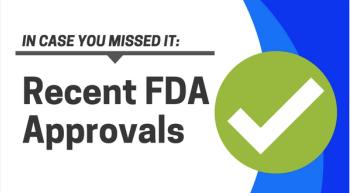
The FDA’s Oncologic Drugs Advisory Committee voted in favor of approving remestemcel-L for the treatment of children with steroid-refractory acute graft-versus-host disease.

The FDA’s Oncologic Drugs Advisory Committee voted in favor of approving remestemcel-L for the treatment of children with steroid-refractory acute graft-versus-host disease.

The FDA has approved Guardant360® CDx for comprehensive genomic profiling in patients with any solid malignant cancer.

The FDA granted an orphan drug designation to the oral investigational modified proprietary tyrosine derivative SM-88 as a treatment for patients with pancreatic cancer.


The FDA approved atezolizumab plus cobimetinib and vemurafenib for the treatment of patients with BRAF V600 mutation-positive advanced melanoma.

The FDA has approved the CAR T-cell therapy brexucabtagene autoleucel (Tecartus; formerly KTE-X19) as a treatment for adult patients with relapsed/refractory mantle cell lymphoma (MCL).

The FDA has granted a fast track designation for the PKCβ inhibitor enzastaurin for the treatment of patients with newly diagnosed glioblastoma.

The drug combination can be taken orally, at home.

A new drug application (NDA) has been submitted to the FDA for pralsetinib (BLU-667) for the treatment of patients with advanced or metastatic RET-mutant medullary thyroid cancer (MTC) and RET fusion–positive thyroid cancers, according to an announcement from Blueprint Medicines, the developer of the drug.


The FDA has approved pembrolizumab (Keytruda) for the first-line treatment of patients with unresectable or metastatic microsatellite instability–high or mismatch repair deficient colorectal cancer. This marks the first immunotherapy approved for this patient population as a first-line treatment and which is administered to patients without also giving chemotherapy.

The FDA approved subcutaneous Phesgo – a combination of pertuzumab (Perjeta), trastuzumab (Herceptin), and hyaluronidase–zzxf – for the treatment of patients with metastatic HER2-positive breast cancer, as well as early-stage HER2-positive breast cancer, as selected by an FDA-approved companion diagnostic test.

The FDA has approved pembrolizumab (Keytruda) or patients with recurrent or metastatic cutaneous squamous cell carcinoma that is not curable by surgery or radiation.

The FDA has had a busy couple of weeks, approving new agents to treat a variety of cancers.

The FDA has approved selinexor as a treatment for adult patients with relapsed/refractory diffuse large B-cell lymphoma, not otherwise specified, who have received ≥2 prior therapies.

The FDA approved tazemetostat to treat relapsed/refractory follicular lymphoma in 2 different indications.

The FDA has approved pembrolizumab (Keytruda) to treat adult and pediatric patients with unresectable or metastatic solid tumors that are tissue tumor mutational burden–high (≥10 mutations/megabase) and have progressed following prior therapy and who have no satisfactory alternative treatment options.

The FDA expanded the approval of gemtuzumab ozogamicin (Mylotarg) to include newly diagnosed pediatric patients (1 month or older) with CD33-positive acute myeloid leukemia (AML).

The FDA approved lurbinectedin (Zepzelca) for the treatment of adult patients with metastatic small cell lung cancer with disease progression, following platinum-based chemotherapy.

On Friday, the FDA expanded the approval for Gardasil 9 for the prevention of oropharyngeal and other head and neck cancers caused by human papillomavirus (HPV) types 16,18,31, 33, 45, 52, and 58, according to Merck, the manufacturer of the vaccine.


The FDA has granted margetuximab an Orphan Drug designation for the treatment of patients with gastric and gastroesophageal junction (GEJ) cancer, according to MacroGenics, Inc., the manufacturer of the Fc-engineered monoclonal antibody.

The FDA has accepted a Biologics License Application (BLA) for ropeginterferon alfa-2b (P1101) for use as a treatment for patients with polycythemia vera (PV) in the absence of symptomatic splenomegaly, according to PharmaEssentia Corporation, the manufacturer of the novel pegylated interferon.

The FDA has approved the combination of ramucirumab (Cyramza) and erlotinib (Tarceva) as a frontline treatment for patients with metastatic non–small cell lung cancer (NSCLC) whose tumors harbor EGFR exon 19 deletions (Ex19del) or exon 21 (L858R) substitution mutations.

The FDA has approved the combination of atezolizumab (Tecentriq) and bevacizumab (Avastin) for the treatment of patients with unresectable hepatocellular carcinoma (HCC) who have not received prior systemic therapy.

The FDA has given a fast track designation to onvansertib for the second-line treatment of patients with KRAS-mutated metastatic colorectal cancer.

The FDA has granted a Fast Track designation to CLR 131 for use as a treatment for patients with lymphoplasmacytic lymphoma (LPL)/Waldenstrom macroglobulinemia (WM) who have received at least 2 prior treatment regimens.


The FDA has approved brigatinib (Alunbrig) for the first-line treatment of patients with ALK-positive metastatic non–small cell lung cancer (NSCLC), as detected by an FDA-approved test.

The FDA has granted an orphan drug designation to fam-trastuzumab deruxtecan-nxki (Enhertu) for the treatment of patients with gastric cancer, including gastroesophageal junction (GEJ) cancer.